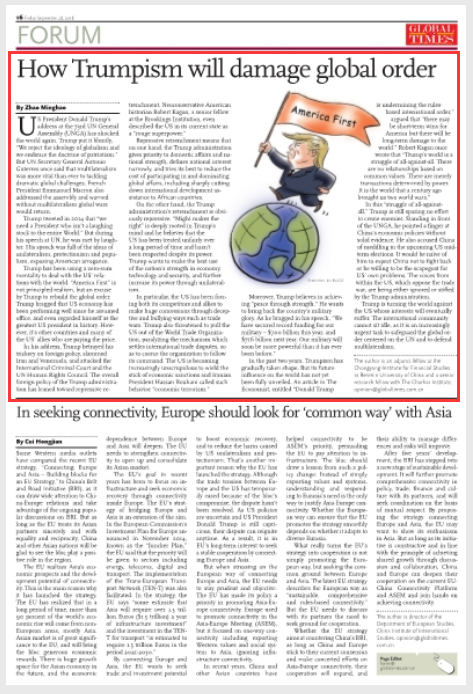Global Governance
Your Present Location: PROGRAMS> Global GovernanceZhao Minghao: How Trumpism will damage global order
By Zhao Minghao Source: Global Times Published: 2018-9-27
US President Donald Trump's address at the 73rd UN General Assembly (UNGA) has shocked the world again. Trump put it bluntly, "We reject the ideology of globalism and we embrace the doctrine of patriotism." But UN Secretary General Antonio Guterres once said that multilateralism was more vital than ever to tackling dramatic global challenges. French President Emmanuel Macron also addressed the assembly and warned without multilateralism global wars would return.

Trump tweeted in 2014 that "we need a President who isn't a laughing stock to the entire World." But during his speech at UN, he was met by laughter. His speech was full of the ideas of unilateralism, protectionism and populism, exposing American arrogance.
Trump has been using a zero-sum mentality to deal with the US' relations with the world. "America First" is not principled realism, but an excuse by Trump to rebuild the global order. Trump bragged that US economy has been performing well since he assumed office, and even regarded himself as the greatest US president in history. However, it's other countries and many of the US' allies who are paying the price.
In his address, Trump betrayed his trickery on foreign policy, slammed Iran and Venezuela, and attacked the International Criminal Court and the UN Human Rights Council. The overall foreign policy of the Trump administration has leaned toward repressive retrenchment. Neoconservative American historian Robert Kagan, a senior fellow at the Brookings Institution, even described the US in its current state as a "rouge superpower."
Repressive retrenchment means that on one hand, the Trump administration gives priority to domestic affairs and national strength, defines national interest narrowly, and tries its best to reduce the cost of participating in and dominating global affairs, including sharply cutting down international development assistance to African countries.
On the other hand, the Trump administration's retrenchment is obviously repressive. "Might makes the right" is deeply rooted in Trump's mind and he believes that the US has been treated unfairly over a long period of time and hasn't been respected despite its power. Trump wants to make the best use of the nation's strength in economy, technology and security, and further increase its power through unilateralism.
In particular, the US has been forcing both its competitors and allies to make huge concessions through deceptive and bullying ways such as trade wars. Trump also threatened to pull the US out of the World Trade Organization, paralyzing the mechanism which settles international trade disputes, so as to coerce the organization to follow its command. The US is becoming increasingly unscrupulous to wield the stick of economic sanctions and Iranian President Hassan Rouhani called such behavior "economic terrorism."
Moreover, Trump believes in achieving "peace through strength." He wants to bring back the country's military glory. As he bragged in his speech, "We have secured record funding for our military - $700 billion this year, and $716 billion next year. Our military will soon be more powerful than it has ever been before."
In the past two years, Trumpism has gradually taken shape. But its future influence on the world has not yet been fully unveiled. An article in The Economist, entitled "Donald Trump is undermining the rules-based international order," argued that "there may be short-term wins for America but there will be long-term damage to the world." Robert Kagan once wrote that "Trump's world is a struggle of all-against-all. There are no relationships based on common values. There are merely transactions determined by power. It is the world that a century ago brought us two world wars."
In this "struggle of all-against-all," Trump is still sparing no effort to create enemies. Standing in front of the UNGA, he pointed a finger at China's economic policies without solid evidence. He also accused China of meddling in the upcoming US midterm elections. It would be naïve of him to expect China not to fight back or be willing to be the scapegoat for US' own problems. The voices from within the US, which oppose the trade war, are being either ignored or stifled by the Trump administration.
Trump is turning the world against the US whose interests will eventually suffer. The international community cannot sit idle, as it is an increasingly urgent task to safeguard the global order centered on the UN and to defend multilateralism.
The author is a visiting fellow at the Chongyang Institute for Financial Studies at Renmin University of China.























































































 京公网安备 11010802037854号
京公网安备 11010802037854号





